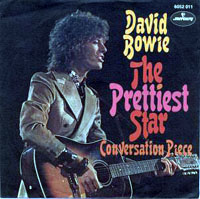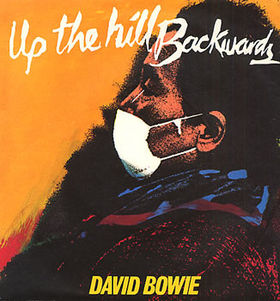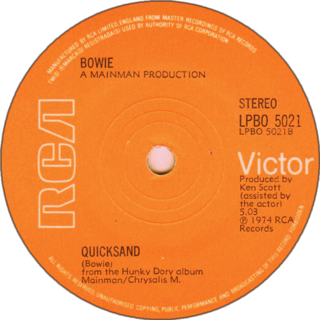Related Research Articles

David Bowie is the second studio album by the English musician David Bowie, originally released in the United Kingdom on 14 November 1969 through Mercury affiliate Philips Records. Financed by Mercury on the strength of "Space Oddity", the album was recorded from June to October 1969 at Trident Studios in London. Gus Dudgeon produced "Space Oddity", while Tony Visconti produced the rest of the album. It featured an array of collaborators, including Herbie Flowers, Rick Wakeman, Terry Cox and the band Junior's Eyes.

The Man Who Sold the World is the third studio album by the English musician David Bowie, originally released through Mercury Records in the United States on 4 November 1970 and in the United Kingdom on 10 April 1971. Produced by Tony Visconti and recorded in London from April to May 1970, the album features the first appearances on a Bowie record of future Spiders from Mars members Mick Ronson and Mick Woodmansey.
"Joe the Lion" is a song by David Bowie in 1977 for the album "Heroes". It was produced by Bowie and Tony Visconti and features lead guitar by Robert Fripp.

"The Prettiest Star" is a song by the English musician David Bowie, originally released on 6 March 1970 through Mercury Records as the follow-up single to "Space Oddity". A love song for his soon-to-be wife Angie, it was recorded in January 1970 at Trident Studios in London and featured Marc Bolan on guitar, who was brought on by producer Tony Visconti. Despite praise from music journalists, the single flopped and failed to chart. Years later, Bowie rerecorded the track for his 1973 album Aladdin Sane. A more glam rock influenced take with lyrics matching themes on the album, Mick Ronson recreated Bolan's guitar part almost note-for-note. The remake was more well-received.

"Up the Hill Backwards" is a song by the English musician David Bowie, released on his 1980 album Scary Monsters . It was later issued by RCA Records as the fourth and final single from the album in March 1981. Originally written under the title "Cameras in Brooklyn", the song was recorded between February and April 1980 at the Power Station in New York City and Good Earth Studios in London. The recording features backing vocalists, guitar contributions from Robert Fripp and acoustic guitar played by co-producer Tony Visconti. Lyrically, the song concerns the struggles of facing a crisis, partially influenced by Bowie's divorce from his wife Angie. Musically, the song contains numerous time signature changes and a Bo Diddley-inspired beat.
"The Width of a Circle" is a song written by the English musician David Bowie in 1969 for his 1970 album, The Man Who Sold the World. Recorded during the spring of 1970, it was released later that year in the United States and in April 1971 in the UK. The opening track on the album, it features hard rock and heavy metal overtones. Bowie had performed a shorter version of the song in concerts for several months before recording it.
"All the Madmen" is a song written by the English singer-songwriter David Bowie in 1970 for his album The Man Who Sold the World, released later that year in the US and in April 1971 in the UK. One of several tracks on the album about insanity, it has been described as depicting "a world so bereft of reason that the last sane men are the ones in the asylums".
"Black Country Rock" is a song by the English musician David Bowie, released on his 1970 album The Man Who Sold the World. The song was recorded in May 1970, with sessions taking place at Trident and Advision Studios in London. The lineup featured Bowie on lead vocals, guitarist Mick Ronson, bassist/producer Tony Visconti, drummer Mick Woodmansey and Ralph Mace on Moog synthesiser. The track was mostly composed by Ronson and Visconti, who developed it using a basic song sketch from Bowie. Labelled under the working title "Black Country Rock", Bowie used the title to write the lyrics towards the end of the sessions, resulting in a repeated two-line verse and chorus. A blues rock and hard rock number, Bowie imitates T. Rex's Marc Bolan in his vocal performance.
"She Shook Me Cold" is a song written by the English singer-songwriter David Bowie in 1970 for the album The Man Who Sold the World. Mick Ronson's solo guitar is influenced by hard rock as played by Cream, Led Zeppelin and Jeff Beck. Although solely credited to Bowie, this and other songs from the album were constructed around jams by all of the musicians. Tony Visconti, who played bass on the track in addition to producing the entire album, was quoted as saying, "The songs were written by all four of us. We'd jam in a basement, and Bowie would just say whether he liked them or not."
"The Supermen" is a song written by the English singer-songwriter David Bowie in 1970 and released as the closing track on the album The Man Who Sold the World. It was one of a number of pieces on the album inspired by the works of literary figures such as Friedrich Nietzsche and H. P. Lovecraft.
"Oh! You Pretty Things" is a song by the English singer-songwriter David Bowie from his 1971 album Hunky Dory. It was the first song he wrote for the album. Bowie recorded the song as a demo before giving it to singer Peter Noone, lead singer of Herman's Hermits, who decided to release it as his debut solo single. Featuring Bowie on piano, Noone's recording was produced by Mickie Most and featured structural and lyrical differences from Bowie's later version. Released by RAK Records in April 1971 under the title "Oh You Pretty Thing", the single peaked at number 12 in the UK, becoming Bowie's biggest success as a songwriter since his own single "Space Oddity" two years earlier.

"Quicksand" is a song written by the English singer-songwriter David Bowie and released on his 1971 album Hunky Dory.

"Queen Bitch" is a song by the English singer-songwriter David Bowie. It was originally released on his 1971 album Hunky Dory before appearing as the B-side of the single "Rebel Rebel" in the United Kingdom in early 1974. Co-produced by Bowie and Ken Scott, the lineup consisted of the musicians who would later become known as the Spiders from Mars: Mick Ronson, Trevor Bolder and Mick Woodmansey.

"Velvet Goldmine" is a song by the English singer-songwriter David Bowie. A glam rock number with lyrical references to oral sex, it was originally recorded on 11 November 1971 at Trident Studios in London during the sessions for his 1972 album The Rise and Fall of Ziggy Stardust and the Spiders from Mars. It was ultimately left off the album and subsequently released as a B-side of the UK re-release of "Space Oddity" in 1975. Praised by biographers as an undervalued classic, it later appeared on compilation albums, including on Re:Call 1, part of the Five Years (1969–1973) boxed set, in 2015. Its namesake was used for Todd Haynes's 1998 film of the same name.
"Lady Grinning Soul" is a song by the English musician David Bowie, released on the album Aladdin Sane in 1973. It was a last-minute addition, replacing the "sax version" of "John, I'm Only Dancing" as the closing track. The composer's first meeting with American soul singer Claudia Lennear in 1972 is often cited as the inspiration for the song. In 2016, after Bowie's death, an interview with Lennear revealed that Bowie called her in 2014, and told her the song had been written about her.
"Big Brother" is a song written by David Bowie in 1973 and intended for his never-produced musical based on George Orwell's Nineteen Eighty-Four. In 1974 it was released on the album Diamond Dogs. It segued into the final track on the record, "Chant of the Ever Circling Skeletal Family".
"Fascination" is a song written by the English singer-songwriter David Bowie and the American musician Luther Vandross for Bowie's Young Americans album in 1975. The song originated from a Vandross song called "Funky Music " which The Mike Garson Band used to play before Bowie concerts in 1974.

"Can You Hear Me?" is a ballad by the English musician David Bowie from his 1975 album Young Americans. Bowie called it a "real love song", written with someone in mind, but he did not identify them. The song was released as a single in November 1975 on the B side of "Golden Years".
"It's No Game" is a song written by English musician David Bowie for his 1980 album Scary Monsters , featuring lead guitar played by Robert Fripp. The song is split into two parts, opening and closing the album. "(No. 1)" is musically sinister, featuring Bowie screaming lyrics and Japanese narration provided by actress Michi Hirota. "(No. 2)", a stark contrast to "(No. 1)", is much calmer, which Bowie's biographers symbolise as Bowie facing the same situation in "(No. 1)", but after the album's duration.
"Karma Man" is a song written and recorded by the English singer-songwriter David Bowie. It was recorded on 1 September 1967 at Advision Studios in London and marked the beginning of Bowie's working relationship with producer Tony Visconti, which would last for the rest of the artist's career. The song expresses Bowie's growing interest in Tibetan Buddhism, concerning a character who is put on display as a "freak" in a carnival tent. The music reflects the Buddhist themes and was likened to the works of the Beatles. Initially proposed as a B-side, it remained unreleased until The World of David Bowie compilation in March 1970. Bowie performed the song during two of his BBC radio sessions, one of which was released on the 2000 compilation Bowie at the Beeb.
References
- ↑ Unterberger, Richie. "After All by David Bowie - Track Info | AllMusic". allmusic. Retrieved 24 February 2023.
- 1 2 3 4 David Buckley (1999). Strange Fascination – David Bowie: The Definitive Story: pp.99–102
- 1 2 3 4 Nicholas Pegg (2000). The Complete David Bowie: p.19
- 1 2 Roy Carr & Charles Shaar Murray (1981). Bowie: An Illustrated Record: p.38
- ↑ O'Leary 2015, chap. 4.
Sources
- O'Leary, Chris (2015). Rebel Rebel: All the Songs of David Bowie from '64 to '76. Winchester: Zero Books. ISBN 978-1-78099-244-0.